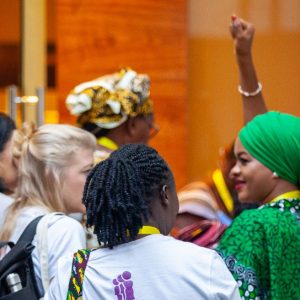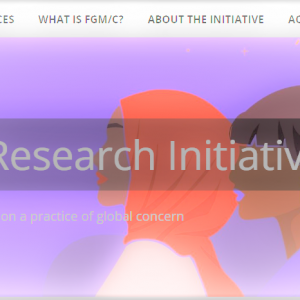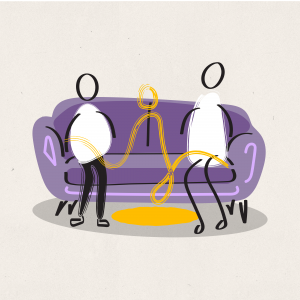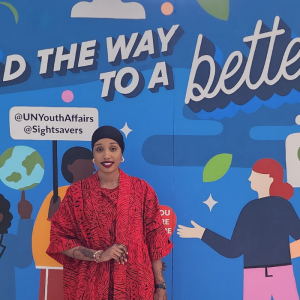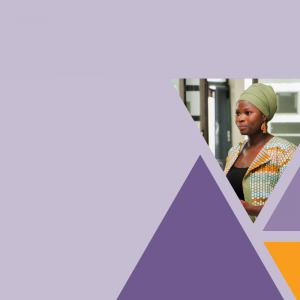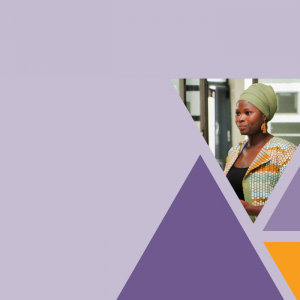Translating research evidence into practice can be a protracted, complicated process. We need sufficient funds to do it effectively, and have buy-in from those implementing the changes; changes that must be seen as acceptable and achievable by our target audiences.
Cultural, religious and gender-based sensitivities, such as those we see around female genital cutting (FGC), complicate that process further, as does the perception that the type of evidence is important, too. A divide has traditionally existed between ‘academic’ and ‘community-based’ research. Academic research is often maligned for its lack of real-world relevance and applicability beyond rarefied scholarly conferences or obscure journals littering dusty library bookshelves.
But it doesn’t have to be that way. It’s a deliberate choice and choices aren’t fixed. Academic and community-based research aren’t necessarily polar opposites. When conducted well, the data they produce can echo each other, producing synergised lessons and harmonised action points that can be implemented in community-level programmes.
As part of a five-year FGC research programme funded by the United Kingdom’s Department for International Development—the Evidence to End FGM/C: Research to Help Girls and Women Thrive—primary data was collected on the practice in Somaliland by academics from Population Council. The headline findings from that work, and how it resonated with existing community-based research, suggest how they can be implemented in communities to end FGC.
Against a background of near-universal prevalence of female genital cutting in Somaliland, two studies conducted between 2016-19 sought to determine if there were any attitudinal or behavioural changes in the practice and the drivers of those changes. Among their main findings were a two-fold change in the practice for health reasons:
- The type of cut was changing —moving from the pharaonic (WHO type III) to what was referred to as the Sunna cut (WHO type I or IV – even though this was interpreted differently among people), especially in urban areas.
This change was attributed to awareness generation and sensitisation in the community by healthcare workers and religious leaders. Most respondents were convinced the change was a positive development, improving the health of girls by minimising harmful health complications; despite the fact that all forms of cutting are harmful and a violation of human rights. It remained unknown whether this change could lead to total abandonment of the practice.
- The cut was being medicalised—linked to the Sunna cut—with health professionals as cutters and cutting occurring at facilities or at individuals’ homes.
Underpinning these changes was a parental need—produced by the medical narrative of anti-FGC campaigns and spiritual leaders promoting the Sunna cut—to find an acceptable balance between health preservation of girls and the socio-cultural and religious normative expectation that a cut is undertaken.
Crucially, only 2% of community members supported abandoning female genital cutting entirely. Changes are happening to the practice but only in the sense that the Sunna cut has emerged as a new norm, a more socially acceptable type of FGC that is justified by religious teachings and perceived health messaging. Consequently, the study found that while existing FGC norms are being contested in Somaliland, there is a need to engage at the community level with religious leaders, health professionals, older members of society (especially influential grandmothers) and young people.
The research conducted by Population Council at the academic level is vital, and it’s crucial to the movement to end female genital cutting that more research is carried out so we understand the scale, impacts and changing dynamics of the practice at a local, national and global level. Crucially it can also complement and validate community-originated research—such as that conducted by the Somaliland Family Health Association (SOFHA) with Orchid Project support—that can be more easily applied within programming.
Since 2015, Orchid Project has been supporting different community-based organisations (CBOs) in strengthening the use of research findings in their work to end FGC. SOFHA approached Orchid Project for capacity building on evidence-based approaches to programming. Amal Ahmed, Executive Director of SOFHA, said of this project:
We were aware of national data on the prevalence of cutting, but wanted to learn how to carry out our own research so we could understand the views of stakeholders in the communities in which we worked. Importantly we wanted to understand which activities were most likely to trigger change.
The resulting collaboration, supported by Population Council, NORAD and The International Planned Parenthood Federation (IPPF), aimed to gather community data to support the design, implementation and evaluation of a multi-year programme to abandon FGC.
SOFHA found their studies resonated with many of the findings in Population Council’s academic research. The complex and powerful social pressures around FGC are greatly underestimated. It is often assumed that FGC continues because of a lack of knowledge of its negative health consequences and therefore communities need to be “educated” on the health risks associated with it. As Amal Ahmed reiterated:
We had to change from educational conversations where we were trying to teach the community about the health risks of FGC, to listening conversations where we were asking more open questions and learning about the opinions and behaviours of community members.
The SOFHA baseline research shone a light on the nuanced decision-making dilemmas which were not previously fully recognised. The study provided a richness and nuance about the very communities with whom SOFHA was working. Parents, religious leaders, teachers and health workers all spoke of facing difficult decisions:
- Some mothers did not want to cut their daughters, but wanted them to have good marriage prospects and for the family not to be ostracised
- Many parents believed that having their daughter cut by a health professional would cause less harm whilst following the community expectation to cut their daughters
- Many Imams explained that it might be ok to leave girls ‘untouched’ as some of them had done with their daughters, however they could not advocate for it because national religious rulings did not permit them to
- Many community midwives wanted FGC to be abandoned but felt under pressure from the community to perform the Sunna cut ‘safely’ using antiseptic and antibiotics.
Echoing the research carried out by Population Council, these findings indicated behaviour change needs more than just knowledge about the harmful effects of FGC. It also needs opportunities for female genital cutting to be discussed openly with neighbours, friends and colleagues. Discussions that can challenge social norms associated with cutting help recognise how difficult change is, and provide mutual support in bringing about collective change.
The SOFHA community-based research also provided strong evidence that FGC is increasingly being performed by health professionals in Somaliland. These findings enabled SOFHA to improve the way midwives and nurses work in clinics, and to adapt their workshops for community midwives and nurses, recognising the decision-making dilemmas they face.
In addition, in 2018 and 2019 representatives from four government ministries and over 20 CBOs participated in knowledge sharing workshops to disseminate the findings of research from Population Council and SOFHA/Orchid Project. Including both national and community-based research generated a rich dialogue and ownership of the findings:
- The workshops promoted evidence-based policy making and subsequently, the lead ministry for FGC—the Ministry for Social and Family Affairs—adopted the SOFHA/Orchid Project research as their benchmark.
- Over half the participating CBOs have enhanced their programmes; particularly increasing community dialogue and involving more young people in community activities to end FGC.
- A CSO-led task force for the abandonment of FGC was established, coordinated by the Network Against FGM in Somaliland (NAFIS), and in which SOFHA plays an active role.
Amal Ahmed noted:
The process of carrying out community-based studies allowed us to develop our research capacity, hone our programming to what the community needs, and bring other CSOs on the journey.
It is an exciting time to be working to end FGC in Somaliland. By bridging the gap between academic and community-based research, the interplay between the two has generated a creative dialogue that can lead to practical measures to end the cut. The establishment of a practice of community-based research on FGC has built capacity across the CSO sector to not only undertake their own community-based research but also to engage with, critique and use national academic research findings. This has resulted in changes in programming and policy-making. We are starting to see small, but significant changes in attitudes and behaviour in the direction of the abandonment of FGC in Somaliland.
As Amal Ahmed reflected:
It’s been so valuable for SOFHA to conduct our own community research and to see our findings mirror those from external academic studies. With FGC being such a sensitive subject, community members are much more open with researchers from the same background. Now, we understand the complexities of the barriers to change and how we can promote change far better. The research itself has started conversations among community members and leaders which hadn’t been happening previously.
Image: Women & child in Hargeisa Refugee camp, where the Somaliland Family Health Association has worked with communities.

